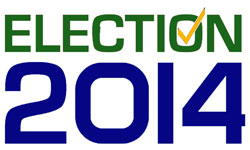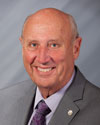
Election 2014: Borrowing for Infrastructure
October 24, 2014 The Chamber is asking all candidates a series of business related questions so you have the information you need to make an informed voting choice. Questions and answers will be posted here twice a week. Check back regularly and follow the Chamber on Facebook for notification of new posts.
The Chamber is asking all candidates a series of business related questions so you have the information you need to make an informed voting choice. Questions and answers will be posted here twice a week. Check back regularly and follow the Chamber on Facebook for notification of new posts.
Question 4: What is your position on borrowing for new capital projects such as cultural facilities or infrastructure. How would you involve the business community in a discussion about this issue, primarily as it impacts on business taxation?
Candidates for Council
Robert Hacking
Borrowing for major capital projects allows the residents that will see the immediate benefit from such projects be responsible for the cost of the project.
As with your own business, we must first have key plans in place to identify the project needs and the funding required so we are not reactive in our actions. In the next 4 years, we will see significant plans be developed such as: the Recreation Master Plan, the Community Cultural Plan, the Sewer Master Plan, in addition to major water twinning projects. Our business community is a key partner in such discussions, and will be part of the critical community engagement that we undertake.
Capital projects have great impact to the appeal of a community as well as its financial position for decades. It is also a serious responsibility that requires stewardship that looks beyond the next four years.
________________________________
Bruce Hallquist
We should only be borrowing money when absolutely necessary, for a project that is at the end of its life, hopefully after some grant money has been awarded and with the borrowing interest rates being favorable. Anything of a major nature would be involved in community consultation. There is just no way around these things not having an tax impact on all parts of the community, but I will, as I always have, try to get the best value for dollars spent and a project in magnitude that is appropriate going into the future for Summerland. Alternate sources of non tax revenue from non revenue producing community assets, such as the gravel extraction plan that is going to be in place shortly,will help fund new capital works.
_________________________________
Doug Holmes
Given the municipality’s debt load situation, new borrowing should be seen as a last resort. We have over-extended ourselves in recent years. Sometimes borrowing is necessary because cutting capital budgets for short-term cost savings can result in long-term expenses. But Council needs to become a better borrower; get more return from borrowed funds and keep the long term in mind. Careful planning is needed to prioritize and determine timescales for infrastructure upgrades. All economic strategies and development plans should consider the impact on taxation, and all will require engagement with local stakeholders including the business community. The availability of provincial or federal funding for specific projects will also have an impact on priorities. And we need to look for opportunities to develop cost-sharing partnerships with businesses and community organizations. Summerland Council requires fresh thinking to re-imagine local infrastructure as more collaborative and participatory, more sustainable and effective.
__________________________________
Denise MacDonald
Don’t overextend on projects unless they are critical to resident’s public safety and health during times of economic strain.
Would re-instate a Finance Committee composed of community members with diverse financial experience to consult with.
Continue to foster a relationship between staff and council based on co-operation and trust so that all internal ideas of cost savings can be investigated.
Recommend that council adopt a 10 year Strategic Financial Plan.
Build a Strategic Financial Plan that is accessible to the residents. The greater the input from the community, the greater and more resilient the Plan.
Investigate setting some debt cap limits for the District.
Manage capital costs and build reserves for cultural facilities and infrastructure.
Need for creative ideas to make taxes work harder.
________________________________
Daniel Papadopoulos
Response not available at publication
_________________________________
Janet Peake
Borrowing money for any of the suggested projects should never be undertaken lightly. It should be discussed seriously and thoroughly by council and with the business members through an organization such as the Chamber of Commerce. The impacts, implications and the reasons for a project should be presented and discussed with the business community and the public at large.
Some infrastructure projects are mandated by the province to be completed by a certain date or an emergency situation occurs such as a major roof repair or a bridge washing out and those situation may require a swifter decision than planning for a new capital project. In an emergency it should still be possible to put the situation and financial impact out to the business community via the Chamber of Commerce and via the media to the general public. If the economy is in a slow period and the municipality has low capital reserves ( that is savings ) then non essential borrowing should not be considered.
__________________________________
 Ken Rodocker
Ken Rodocker
It is important to improve our infrastructure and look at possible cultural facilities. So, yes, I would look at the feasabilitily of borrowing funds in a fiscally repsonsible manner to accomplish this. We could have a forum, based on the Business Adivsory Commission format, using a webpage link facilitiated by the Chamber of Commerce.
___________________________________
Mark Smed
Borrowing only makes sense when the district is looking at doing large projects, beyond what the town can pay for in a single year. This weekend I read some of the hundreds of pages of reports on the condition of various components that make up our infrastructure. Borrowing to pave roads or replace an aging water line does not make sense. Unfortunately, if these systems have been neglected over other projects, it may be required to either increase taxes or borrow funds. I would not support any change to our tax structure until I have a better understanding of our financial situation and the condition of these systems
___________________________________
Erin Trainer
I am not against borrowing money for infrastructure projects if there is an urgency to get them completed. As well, if provincial or federal grants are available, I believe it’s worthwhile to make use of this money and borrow the remainder (if required) to complete a project.
Much of Summerland’s infrastructure is aging and will need to be upgraded in the near future. To avoid borrowing, I think it’s a wise decision to establish a capital reserve fund. Money from district land sales and/or gravel sales could go toward the fund each year.
I think it’s vital to include the business community in these discussions. This community requires good infrastructure in order to conduct business – but at the same time – can’t afford to pay much more in taxes. If a borrowing opportunity did present itself, it would be critical to hear from business owners through a consultation process.
___________________________________
Martin (Marty) Van Alphen
I am not too keen on borrowing money for new capital projects such as cultural facilities or infrastructure. My preference will always be to seek out grants such as those which have enabled us to complete the round-a-bouts and flood control on Prairie Valley Road. We have also traditionally done very well with partnerships or joint-use agreements such as our Recreation Centre, Centre Stage Theatre and more recently proposed Skate Board Park. The Municipality is also actively exploring a way of Investing in our own Community through RRSP’s (please see more information on this exciting initiative on the July 14th, 2014 Council Report titled “Local Investment for Economic Development Opportunity Development Cooperatives”). Finally, I will continue to lobby senior government to provide funding for projects such as Councils #1 priority which is the water-twinning in Garnett Valley.
____________________________________
Richard Barkwill
In his report to council on October 14, Tom Day the CAO, said Summerland had a “massive infrastructure deficit that is growing and growing”…. ”just getting farther and farther behind” This is the responsibility of the existing council and their spending.
My proposal to extend sewer to the Municipal lands at the foot of Cartwright would see those lands increase in value far more than the cost of the service extensions. The land could then be sold with the profits used to fund new capital projects.
Putting this land on the market also has the benefit of satisfying all of Summerland’s needs for developable land in mid-term future and makes it economic to develop the land beyond Deer Ridge next, including the municipal land recently taken out of the ALR.
Whether you are for or against the land swap this plan makes the swap entirely unnecessary plus funds our needed infrastructure.
___________________________________
Toni Boot
I am certainly open to the possibility of borrowing for capital projects, but would agree to doing so only after a comprehensive review of the proposal.
My decision would only be made after I feel I fully understand the financial implications and I am satisfied pertinent questions are favourably answered including, though not limited to:
-Where does the proposed project stand priority-wise amongst other capital projects?
-Will the project make Summerland more self-reliant, i.e., fill a need in Summerland or be the means toward filling a need?
-Will the project benefit the majority of citizen
-Are there cost-sharing programs that can assist with funding.
-Are there fundraising opportunities that are appropriate for the capital project? For example, cultural events and/or programs to raise awareness and garner financial input from within and outside our town?
-Are business and/or investment opportunities possible as a direct or indirect result of the capital project?
__________________________________
Erin Carlson
If we need to rebuild infrastructure to replace existing infrastructure, we will have to find ways to pay for improvements. If cultural facilities begin wearing out and the people rely and use these spaces on a regular basis, they should be replaced as needed.
We must realize that needs are different than wants.
Borrowing money is a burden on all tax payers of Summerland and all residents benefit from improvements. Better infrastructure and cultural facilities may attract more business!
There are processes and regulations in place and we elected officials must follow them.
_________________________________
John Dorn
Saving up for projects is always preferable to borrowing. If we are going to borrow, especially for infrastructure, now is the time with low interest rates.
Involving the community at the drafting stage of projects avoids dis-affecting taxpayers after the fact. My policy of consulting with citizen and community committees supports this approach.
It would have to be a sizable cultural project to warrant borrowing unless sports facilities such as the pool and arena are included.
In order to entice new businesses and entrepreneurs (which I maintain is top priority) our infrastructure and amenities have to be first-class. Investing wisely for the future pays off.
________________________________
Marty Fisher
Response not available at publication
_________________________________
Joel Gregg
Debt is a tool, like a sharpened knife. In the hands of a skilled surgeon it can be very useful, but in the hands of a mad man it can be lethal. Being 41 years old with boys 10 and 7 years old and being heavily invested in our community, I have a personal interest in making sure our community is well maintained, both financially and infra-structurally (made up word). Borrowing is not only a great way to leverage our assets into capital projects, but it also offers a way to invest in our local financial institutions (who in turn invest back in our community).
If borrowing makes sense, and if we as a community stand to prosper, I have no problem wielding this tool. Let’s ensure we place “skilled surgeons” around our council table and not “mad men.”
___________________________________
Candidates for Mayor
David Gregory
USE COMMON SENSE. With respect to a cultural facility, Summerland’s long-time community plan was to link a new Cultural/Event Centre with a new library. Joined buildings share facilities such as staff rooms, restaurant, classrooms and makes a cultural/event centre more realistic and affordable. Joined community buildings also allow for greater grant opportunities. Three current councilors rejected such a proposal, a proposal fully supported by the business community. Loss of this cultural/event centre is loss for our community and business community.
With respect to infrastructure, linking projects to grants is imperative. A weakness of Councils including mine, was not delegating a staff member to explore grant applications. We are simply missing too many opportunities for financial assistance.
Communication between Council & Chamber already exists and should be maintained. We should use the Federal Gas Tax fund to improve the safety for roads and sidewalks especially around our schools and senior facilities
____________________________________
Orv Robson
We have two separate borrowing ventures in this question. In my view infrastructure would take precedent over borrowing for cultural facilities. If Federal and Provincial Funding Grants (Build Canada Fund) were made available for either project, then as a Council we would have to look and ensure we had the required one-third Municipal portion available to fulfill our obligation to the project. Business to Residential taxation ratio is 2.7 to 1, which has a significant impact on the bottom line for business. If the loan is paid back in five years, it is not necessary to go to a referendum. These ventures are costly and will likely necessitate public input through a referendum, which would ensure dialogue with the businesses. That is why it is important to have growth, to meet continuous demands for tax dollars and have a healthy business core.”
_______________________________
Peter Waterman
Functional status of facilities and infrastructure must be updated if there is not already a recent report. The ideal situation is to set aside replacement funds over time. Repairs and operational costs have to be factored in. At some time operational costs and repairs and maintenance exceed the cost of borrowing. Therefore some combination of allocated reserves and borrowing has to be considered. If such potential borrowing can be assisted with grant funds, a project becomes realistic to consider. Under current regulations if the borrowing period exceeds 5 years the project must go to referendum or the use of the alternative approval process takes place. The business community is a critical part of the discussion as their current share of the multiple of residential taxation ranges between 1.95 for class 5 and 2.7 for class 6 businesses. Thorough consultation must take place.
_________________________________
Roch Fortin
A decision to spend funds on Capital Projects is an important, yet complicated, decision. Borrowing monies in order to construct these improvements complicates the decision process even further. Often the Provincial and Federal Governments have grant programs available for municipalities to use for Infrastructure Upgrades, Cultural, Sporting, Convention & Health Projects or Downtown Re-vitalization Projects. It is my position that every dollar spent by Summerland, needs to have a maximum economic and social impact on the businesses and residents of Summerland. At the same time spending monies on project should have minimum impact on the tax paid by everyone in the District.
Prior to making final decisions on these types of initiatives, a clear picture of the costs and benefits needs to be prepared and openly debated. As major participants in the taxation process,business owners in Summerland need to be informed and have the opportunity to present their opinion on the matter.
__________________________________
Christopher Boisvert-Gilman
With the formation of the Summerland Community Component Working Group – Police, Arts, Tourism, Agriculture, Developers, Environment, Youth, Seniors and Business in particular, new capital projects are feasible. Brain storming includes potential impact on business taxation and highlights the SUMMERLAND FIRST PROGRAM. Spending on new projects must show Wisdom.
August 25, `14, Summerland’s council gave $60,000 Okanagan Library that already had beautification monies. A 17 year old said: `I would have put the monies towards fixing the leaking arena roof.”
Summerland must have a plan for maintenance for infrastructure. Summerland has a pothole program. A used asphalt paving machines costs approximately $40,000; working with a local trades program, students work on the machine [winter], experience a practicum [spring] and full-time summer employment; our pothole workers could start paving by 2015.Christopher brings to the Mayor`s seat innovative cost effective thinking with open, accountable and fresh approaches to problem solving!”
Shalom.


Leave a comment